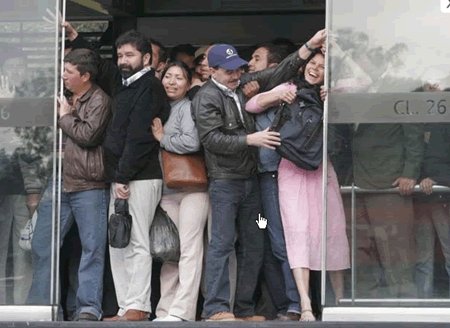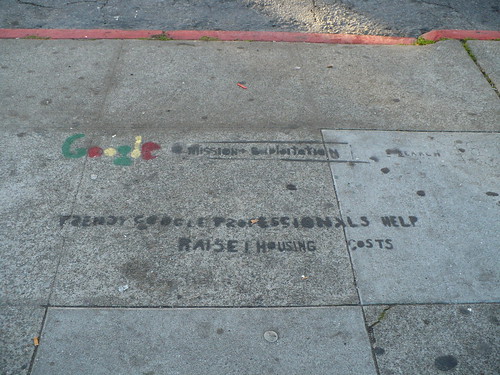Monday, October 24, 2016
Podcast: Remixing Transit Planning in Cities
Friday, May 6, 2016
Podcast: The Indian Transportation Context
Monday, April 6, 2015
Podcast: Houston Part II - Transportation Time
Monday, December 14, 2009
Half the Story McCrory
McCrory is credited with pushing through a transportation plan that, with the help of a $200 million federal grant for light rail, revitalized blighted Charlotte neighborhoods. On Friday, he visited with about 200 advocates of returning electric trolleys to the Fort Worth streets.
Now that light rail is on the ground in Charlotte, he said, "our bus ridership is not just people who have to have it but people who want to ride it. Bus ridership is all races and classes. The bus system is unbelievable now."
What happened in Charlotte was not only the construction of light rail and the planning for a rapid transit network, but most of the half cent sales tax went into improving bus service. This is what the referendum focused on back in 2007. If passed, it would have severely hampered the bus system as well as the LRT expansion. But as a reward for the investment, Charlotte has had substantial gains in ridership directly related to the upgraded network and improved service.
Monday, October 19, 2009
A Small Charge
Friday, July 31, 2009
Joe Metro
Favorite Lyrics:
Northbound, now we start to pick up more college kids
They try to study on the ride
To make up for the fact that they probably kicked it hard last night
And I ponder if it's time to save up and get a car
And pay for the gas that we're takin' from the war
I'd miss all the colorful faces, the places, and spaces I've embraced with
H/T Reader AMBrown
Monday, July 20, 2009
Roadkill
It's good though in one sense, no one can call them trolleys anymore.
 Flickr photo by Cackhanded
Flickr photo by Cackhanded
Sunday, July 19, 2009
It's the Priority, Not the Perception
As I travel U.S. cities, it is unusual for public transit not to come up as a priority. But buses are rarely mentioned. Cities want the sexy stuff -- light rail, trolleys and trams. I was reminded of this as I was reading again about Bogota's Bus Rapid Transit (BRT) and London's newly redesigned buses.Aside from mass implementation, there is not much that can be done to improve the feel of riding the bus. Oakland tried this with buying the Van Hools (a whole other discussion) and many other agencies have tried or are trying small fixes such as San Francisco's stop spacing redo. It's still a bus and it has it's function in the transit spectrum. The problem is that it runs in traffic with cars and stops every other block. And all United States systems are woefully underfunded, bus or otherwise, such that better diversity in service is not provided.
But then there is this:
And the TransMilenio carries none of the negative stereotypes associated with buses.Say what? Just because Enrique Penalosa says that doesn't mean it is so. I've obviously never been to Bogota nor plan on going, but the BRT there has many freeway centered sections and still runs on rubber tires and still operates using a third world pay scale for its drivers. This means no pedestrian friendly TOD opportunities around the station and you're still on the bouncy bus when the concrete shifts. Not to mention the crowding and operating costs.
 Flickr photo by Pattoncito
Flickr photo by PattoncitoI understand the allure of BRT, and I honestly think that more bus routes should get a lane such that BRT is more the norm in dense urban areas. This only comes with a change in our own perceptions of what is a priority, not so much the current perception of what buses are. This means building more metro systems, more light rail, and dedicating more lanes to transit and bikes. That is a fundamental shift that needs to happen, not just focusing on making buses a tiny bit better by renaming them.
Monday, July 6, 2009
A Day in the Life
But today I took my car to Broadway in Oakland and dropped it off. "Can I get you a courtesy Shuttle?" says the service manager. "No thanks, I'll take the bus". I walked through the showroom where everyone else was waiting for thier shuttle to take them to thier car needy areas and stepped out to the 51 bus stop. I hopped on and waited five minutes for the driver to load a wheelchair customer who almost ran him over. "Whoa, slow down man" he said to the motorized wheelchair owner who wanted to back over his feet while he held the seatbelt up for him. The rest of the trip to 14th and Broadway took about 6 minutes. Not long at all.
Later that evening when I got off work, I hopped on BART and rode to Powell. I got off and walked up stairs to the Muni Metro and hopped on the J Church LRV. I hopped off at Church and Market and walked into Safeway to buy groceries for the next few days. I walked back out and back onto the J to go home to 24th street.
That's pretty cool. I drove, took the bus, took the subway, took the Muni Metro and walked today while running a number of different errands that were on the way to my final destination. All possible because I live in a place that gives me options. I wish more people could do it this way and I know there are plenty of people out there who wish they could have the opportunity, but our leaders are denying them the option on the false premise of car superiority and lame numbers.
Thursday, June 11, 2009
I Wear My Sunglasses At Night
Munch on this for a second. If all of the sudden every streetcar and commuter train that ever ran was to suddenly reappear, would we still need buses? I would argue "absolutely, yes".Ditto. As Bruce McF always says, buses and trains should be friends.
Tuesday, June 2, 2009
The Battle for Charlotte 07
This one was set in a bar. Apparently these two folks had a lot in common:
This one was two former Charlotte Mayors who apparently never agree on anything. They agreed on this:
Finally, they got recently retired and fan favorite Mike Minter to do a spot on saving the transit tax:
Wednesday, May 13, 2009
On the Coalition of Sustainable Transport
For the rest of you: what's your excuse? Why would you continue to rely on such wasteful and expensive transportation options — a label that applies to both cars and buses — when you could use the most efficient vehicle ever invented?First off, a bus is nowhere near as wasteful as a car, especially here in San Francisco where many of our transit lines are electric and powered by hydro plants as well as packed to the brim with riders. Second, while I really love the fog in San Francisco, it's like the humidity in Houston that uses moisture to boil you alive, but instead chills you to the bone. It's not hard to wonder on a cold rainy day why someone might want to have the option of taking Muni. Transportation should be multi-modal to give people options. If we start to think our mode is the best for everything, we're no better than highway engineers and the sprawlagists.
I understand that it was probably supposed to be a rhetorical question, but I'd like to think we're in this together against the car culture that keeps modes of more efficient transportation from thriving. Perhaps many cyclists share this feeling, that Muni is not needed, however I believe that would be a dangerous mistake to make, and bust up a winning coalition that seems to have cars on the ropes, even if we do suffer setbacks such as today's budget fail.
Sunday, May 3, 2009
Creative Bus Stops
Via DTO on Twitter.
Saturday, March 28, 2009
The Foot Bus to School
I find it interesting that a small town in Italy is looking to cut greenhouse gases by creating foot buses, groups of kids walking to school together. Seems like a great idea to me. From the New York Times:
They set up a piedibus (literally foot-bus in Italian) — a bus route with a driver but no vehicle. Each morning a mix of paid staff members and parental volunteers in fluorescent yellow vests lead lines of walking students along Lecco’s twisting streets to the schools’ gates, Pied Piper-style, stopping here and there as their flock expands.
Thursday, March 26, 2009
The Noe Google Buses
I'm kind of torn on these shuttles. On one hand, it's a really huge freakin bus running up a residential street. But it is getting people that would likely be driving down 101 into more fuel efficienct ways. I don't have the same problem as others seem to have, complaining that affluent people have come to live in the neighborhood.

On the other hand, it's very stupid and un-environmental for these companies to locate such large office clusters away from conventional transit hubs. For all this talk of being green and forward thinking, companies like Google prove with their locational decisions that they don't understand how much transportation and land use plays into greenhouse gas emissions. But most of silicon valley is like that. Worst. Employment. Sprawl. Evah.
Because so many people want to live in a place that is walkable like San Francisco, you would think that businesses in the South Bay would look harder at trying to make more places like that instead of allowing even more junk down there. Facebook has actually caused a price spike in Palo Alto for helping thier workers live closer to work. I think this is a better solution than the shuttle buses but these companies are also skewing the local housing markets.
For "campuses" like Google, it seems that they could have built an office building downtown (they do have some offices in San Francisco) and saved more of thier employees money by allowing them to easily take transit to work. Instead they get more free parking which I would say if there is free parking at work, it is even more incentive to not live a location efficient lifestyle. Especially if you think you're special because you have solar panels over the parking. I wonder how much more Greenhouse Gases each of their employees emits because they drive a lot versus the amount of greenhouse gases those solar panels save.

Tuesday, March 17, 2009
Appreciating Bus Drivers
Saturday, January 31, 2009
Punctuality in Cali...Columbia.
The fight between good and evil is represented by the colors green and red, at least that is the way Miguel Castro sees it. Castro is a bus driver in the Colombian metropolis of Cali, and the two colored lights on his dashboard tell him whether he is behind schedule or not. For Castro the panel of lights is a small revolution. Prior to their arrival, there were only the timetables to rely on -- treated by drivers more as a broad recommendation than as hard and fast rules.H/T Planetizen
Saturday, January 17, 2009
"Experts"
"Sperling is the co-author (with Deborah Gordon) of Two Billion Cars: Driving Toward Sustainability, a book that considers the environmental impact of so many automobiles and suggests ways that politicians, car companies and the general public can curb car-ownership and reduce climate change."
While most of the talk is on technology, he discuss the roles of transit, land use, and bicycling and car-share. "Mass transit won't solve our energy and transportation problems," states Sperling. The average bus passenger contributes as much greenhouse gases as a car driver because the buses aren't full, he explains.
Wonder which O'Toole he got that data from?
